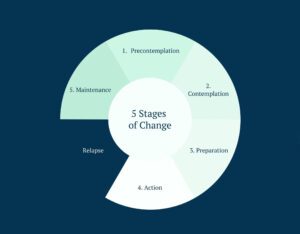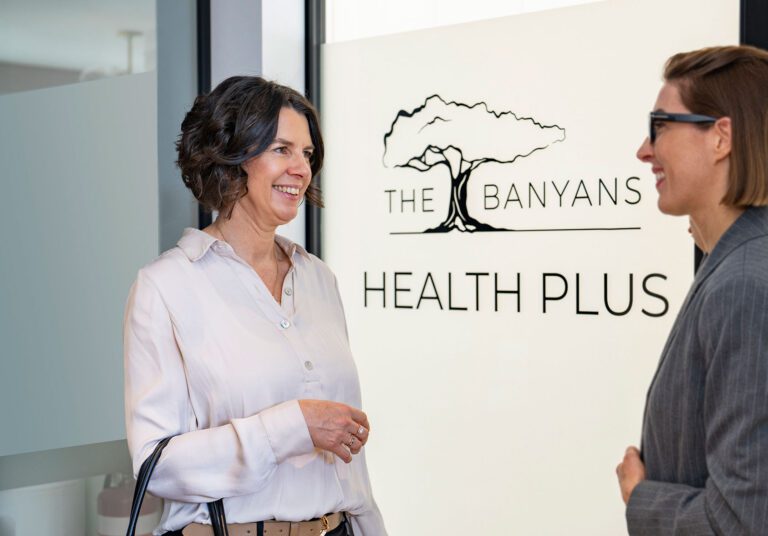
When a loved one is going through the kind of crisis that mental health or addiction often represents, understanding how to provide loving support can be a complex and challenging experience. This is why familiarising yourself with the stages of change can be very effective for both the individual struggling with addiction and their support community of family and friends.
Mental health and addiction challenges can impact on every part of an individual’s life. That’s part of the reason why learning how to navigate rehabilitation alongside your loved one can be such a personal experience. Family and friends can often find themselves highly affected or emotionally drained, even as they try to offer genuine and meaningful support.
By understanding the process of behavioural change, a person supporting their loved one moving towards mental health or addiction rehab can better comprehend the unique requirements of each stage of change. By equipping themselves with these tools and knowledge, family and friends can assist more effectively in providing intentional aid for their loved one.
This guide for supporting a loved one aims to provide you with practical strategies, paired with empathetic insights that can provide holistic and sustainable support for both you and your loved one throughout this highly challenging time and treatment. By empowering yourself with this knowledge, you can face the unknown journey ahead with more clarity, understanding and awareness of the different stages to come – and what each may require of you in a key support role to your loved one.
The Stages of Change: A Roadmap for Human Behavioural Change
This psychologist-developed Stages of Change model, provides us with a roadmap to understanding human behavioural change. As sustainable behavioural change is often the cornerstone of meaningful recovery from addiction or mental health disorders, understanding this model can be extremely beneficial, both to the individual and their support network.
The stages of change model is divided into five stages: Pre-contemplation, Contemplation, Preparation, Action, Maintenance, and Relapse.
If you’ve ever watched a loved one get close to making a recovery commitment, only to step back into old patterns and behaviours, this model can be a powerful tool in understanding how each stage of change impacts upon the long-term progress towards rehabilitation.
For example, your loved one may not be able to see the negative effects of their substance use, meaning they’re not yet able to see a need for change. Alternatively, even if they know a change is needed, they may not feel capable of actually making that change, or perhaps they’re too afraid of what’s ahead to commit to finding a new way forward.
This is where the stages of change model can be extremely beneficial for both you and your loved one who’s in the midst of addiction. It can help you both to see where they are in the overall change process, understanding what that means about their willingness to take action, the kinds of emotions you may need to navigate in suggesting a change, and how to best support them based on that particular stage of their overall journey.
Here’s a step-by-step approach to understanding each stage of change, and how you can be of genuine support to your loved one during each stage.
Stage of Change One: Pre-Contemplation
For many friends and family members witnessing their loved one in the midst of addictive behaviours, this can be one of the most challenging stages to navigate. During pre-contemplation, the individual may not yet believe that a problem exists, nor have a desire to change.
What you may experience with your loved one during this stage:
Denial of a problem existing
Defensiveness
Rationalisation
A lack of awareness about consequences
A lack of interest in any change
If you recognise these behaviours in your loved one, the following approach is recommended:
- Be patient and understanding
- Initiate non-confrontational conversations
- Share key resources about support for addiction and rehabilitation
- Keep expressing love and concern
- Encourage self-reflection
It’s also essential to steer clear of forcing the issue, creating ultimatums, enabling behaviour, or blaming or criticising.
Chief Psychologist of The Banyans, Peter Hayton, states “you must be gentle in your approach with your loved one, and protect your own emotions during this time of frequent turbulence and potential pain”.
Stage of Change Two: Contemplation
In the second stage of change, contemplation, your loved one may begin to become aware or acknowledge the existence of a problem.
This may look like:
- Fluctuating between wanting to change and fear of change
- Expressing concerns and fears
- More openness to discussion
You can support your loved one through this stage by:
- Being supportive and encouraging, reassuring them that change is possible
- Maintaining open communication
- Sharing the stories of people who’ve overcome addiction successfully
- Continuing to be patient as they weigh their decision
Peter recommends that you avoid the temptation to rush them, as pressuring an immediate decision could only serve to increase fear about the process ahead. Avoiding judgment and openly discussing their fears about the unknown can also be powerful steps of support during the contemplation stage of change.
Stage of Change Three: Preparation
This stage may feel like an encouraging breath of fresh air if you’ve having moved through the previous stages of change.
In this stage, your loved one may:
- Demonstrate a genuine intention to change
- Start to plan and gather information about their treatment options
- Take small steps towards seeking support
In this stage, supportive friends and family members are encouraged to:
- Assist in the planning and research process, evaluating rehabilitation and recovery programs available to their loved one
- Suggest the support of other close and trusted friends, family members or support groups
- Celebrate and acknowledge even small changes
- Continue to prioritise open communication
It’s also important to avoid setting unrealistic expectations, putting pressure on your loved one to undergo a treatment they’re uncomfortable with, and to avoid criticising their plan or efforts.
RELATED POST: Finding the Best Rehab in Australia
Stage of Change Four: Action
In the action stage of change, you may notice genuine changes as your loved one begins to take larger steps forward.
This may look like:
- Becoming actively involved in their own treatment
- Making concrete changes in their behaviour, such as looking for healthier coping mechanisms, avoiding substances, or engaging professional support
- Constant emotional highs and lows
- Observable progress in their lifestyle and behaviours
During the action stage of change, you can support your loved one by:
- Continuing to offer practical support (such as taking them to therapy sessions)
- Supporting every achievement
- Keeping communication open
- Encouraging the use of developing healthy coping mechanisms and strategies that aren’t damaging to their health
“You may be tempted to micromanage their progress,” shares Peter, “but refraining from doing so will ensure your loved one remains in ownership of their recovery journey.”
Stage of Change Five: Maintenance
The maintenance stage of change may present the most obvious outcomes of the hard work your loved one has been doing to overcome their mental health or addiction challenges.
This may look like:
- Sustained abstinence
- New routines
- Increased confidence
- A potential ongoing fear of relapse or the risk of triggers
This is a crucial stage for you to continue to offer your love and support by:
- Encouraging new, positive habits
- Remaining alert for signs of a potential relapse
- Continuing to celebrate their ongoing success
While you may assume the journey is over, it’s important to remember that recovery is a process your loved one will go through for the rest of their life. By learning to avoid triggering situations or conversations, as well as continuing to respect their autonomy, you can be a key support in this ‘new normal’.
Relapse & Its Relationship to Change
While relapse won’t happen for every individual in recovery, this can be a common part of behaviour change. It’s important to remember that it doesn’t mean your loved one has done the ‘wrong’ thing.
Although it’s natural to feel disappointed when relapse occurs, by acknowledging that the relapse stage can be a common part of a recovery experience, you can help to reduce shame and provide necessary support in overcoming a relapse and getting back on track.
This is one reason The Banyans most popular residential programs extend well beyond an individual’s program completion. Our team partners with guests for many months after their program to assist in transitioning through the 5 stages of change, from the action stage to the maintenance stage, and support guests through any slip-ups that may occur.
World-Class Treatment: The Banyans Mental Health & Addiction Programs
No matter where your loved one is in the stages of change, help is available to you both as you navigate addiction rehabilitation. By seeking help sooner rather than later, you can find the necessary resources for both your loved one and yourself as you work through each part of the recovery process.
Looking for professional support in your loved one’s recovery journey? Speak to our expert team for a non-obligatory discussion any time on 1300 226 926, or make an enquiry below.
This article was reviewed by The Banyans Chief Psychologist, Peter Hayton.


















